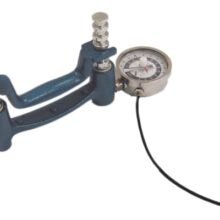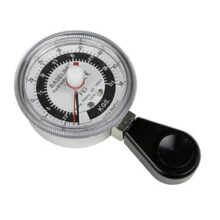Hydraulic Hand Dynamometer
Typically Ships in 1-2 weeks
The Baseline Hydraulic Hand Dynamometer is designed to measure hand strength without the patient being able to “feel” the handle move.
Dynamometers are essential tools in sports medicine that allow healthcare professionals to objectively measure and assess muscle strength and performance. These devices provide valuable information that helps in injury rehabilitation, performance enhancement, and overall athlete management.
In this article, we explore the importance of dynamometers in sports medicine and how they contribute to assessing strength, tracking progress, and optimizing athletic performance.
Dynamometers play a critical role in objectively assessing muscle strength. They measure the force exerted by muscles during specific movements or isometric contractions, providing accurate quantitative data. This information allows healthcare professionals to evaluate the strength of specific muscle groups, identify any imbalances or weaknesses, and compare an athlete’s strength to established norms or benchmarks.
Objective strength assessment using dynamometers enables the development of targeted strength training programs and aids in identifying potential areas of concern or injury risk.
Dynamometers are valuable tools in the rehabilitation process of sports-related injuries.
By objectively measuring strength, healthcare professionals can assess the progress of an athlete’s recovery and determine the effectiveness of rehabilitation protocols. Comparing pre-injury and post-injury strength measurements helps healthcare professionals track an athlete’s progress and make informed decisions regarding the timing and intensity of return-to-play protocols.
Dynamometers also assist in identifying any remaining weaknesses or muscle imbalances that may contribute to reinjury or hinder performance.
Dynamometers are instrumental in optimizing athletic performance by providing precise data on strength gains and progress over time.
By regularly assessing muscle strength and monitoring changes, sports medicine professionals can tailor strength training programs to address specific weaknesses and enhance performance.
Dynamometer measurements help establish baselines and set realistic goals for athletes, enabling them to track their progress and make adjustments to their training regimens accordingly. This objective feedback empowers athletes to focus on areas that need improvement and design targeted training strategies to maximize their athletic potential.
Dynamometers allow for individualized training programs based on an athlete’s specific strength capabilities and goals. By identifying muscle imbalances or weaknesses through strength assessments, sports medicine professionals can design personalized training protocols to address these areas. This individualized approach promotes muscle symmetry, improves functional strength, and reduces the risk of overuse injuries.
Dynamometers also assist in the prevention of future injuries by identifying areas of weakness or instability that may lead to compensatory movements and subsequent injuries.
Dynamometers provide valuable data for research and data analysis in sports medicine. Large-scale studies utilizing dynamometers help establish normative data for different age groups, genders, and sports disciplines. This information serves as a reference point for healthcare professionals in the assessment and management of athletes.
Additionally, dynamometer data can be analyzed to study strength profiles across various populations, investigate performance differences, and evaluate the effectiveness of different training interventions. Such research contributes to evidence-based practice in sports medicine and guides the development of effective strength training protocols.
Dynamometers are integral tools in sports medicine that assist healthcare professionals in assessing strength, monitoring progress, and optimizing athletic performance. These devices provide objective data that help identify muscle imbalances, track rehabilitation progress, and design individualized training programs.
By utilizing dynamometers, sports medicine professionals can make informed decisions, tailor interventions, and enhance athlete performance while reducing the risk of injuries. The use of dynamometers facilitates evidence-based practice, research advancements, and overall excellence in sports medicine care.

Typically Ships in 1-2 weeks
The Baseline Hydraulic Hand Dynamometer is designed to measure hand strength without the patient being able to “feel” the handle move.

Typically Ships in 1-2 weeks
The Baseline Hydraulic Pinch Gauge is designed to reliably and accurately measure up to 50 lbs (23 kg) of pinch force.